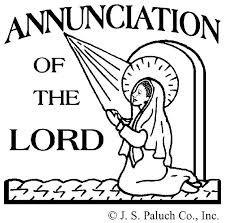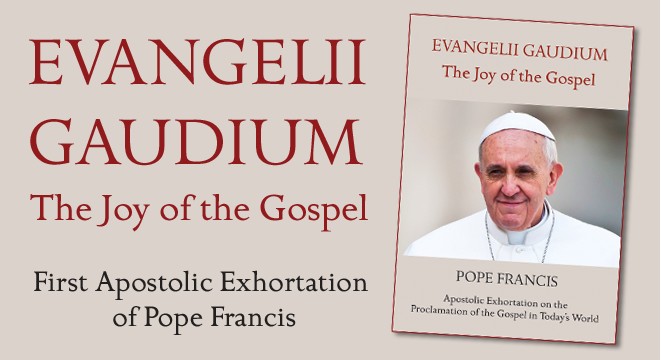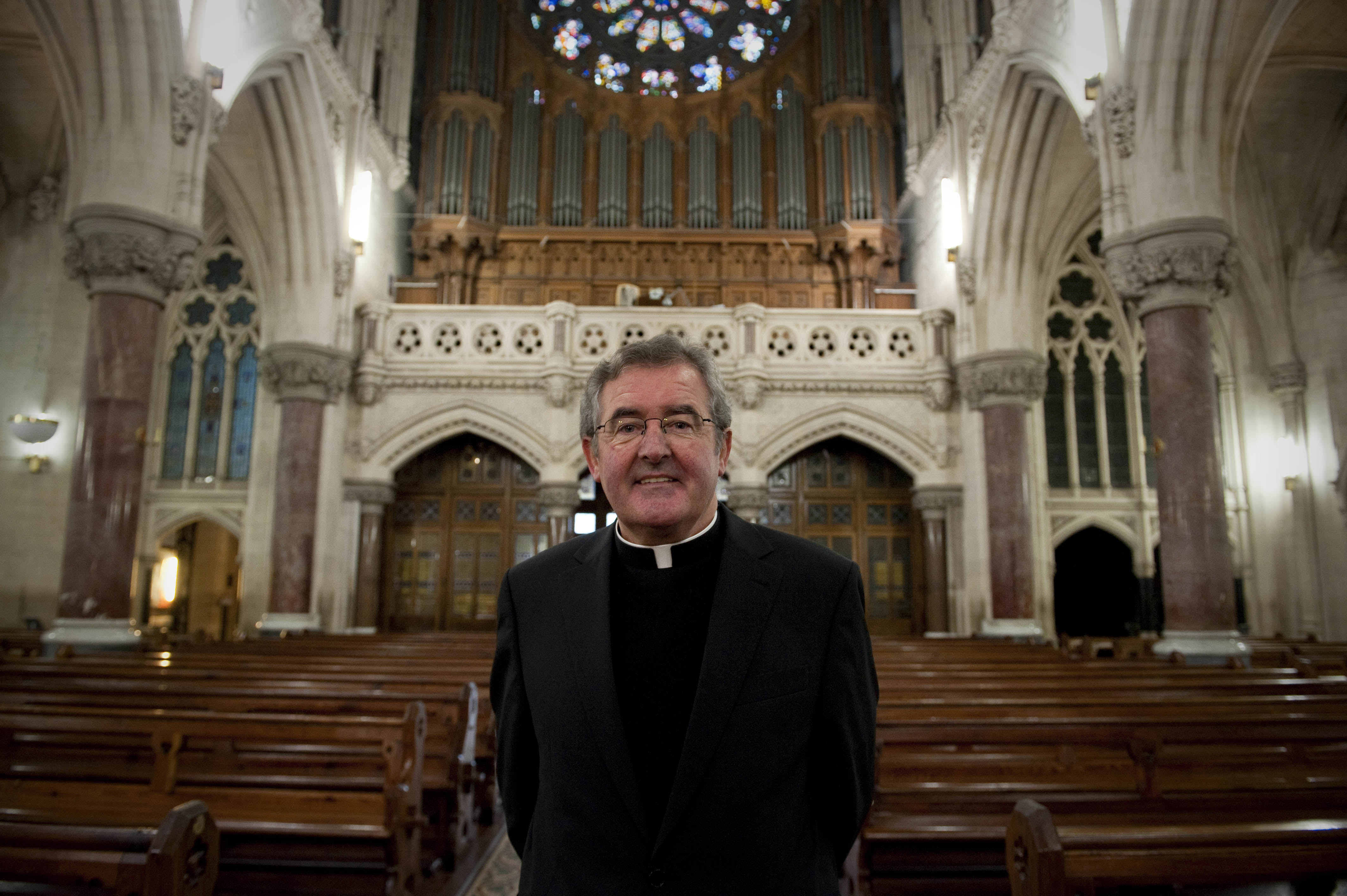Readings for Tuesday 25 March 2014 (3rd Week of Lent)
Is 7:10-14, 8:10. Ps 39:7-11, R/ vv 8, 9. Heb 10:4-10. Lk 1:26-38. www.catholicbishops.ie/readings.
Solemnity of the Annunciation of the Lord
‘Giving her consent to God’s word, Mary becomes the mother of Jesus. Espousing the divine will for salvation wholeheartedly, without a single sin to restrain her, she gave herself entirely to the person and to the work of her Son; she did so in order to serve the mystery of redemption with him and dependent on him, by God’s grace’ (Catechism of the Catholic Church, 494).
“Jesus is never far from us sinners. He wants to pour out on us, without limit, all of his mercy.
Follow Pope Francis on Twitter @Pontifex.
Excerpt from Evangelii Gaudium The Joy of the Gospel
“A renewal of preaching can offer believers, as well as the lukewarm and the non-practising, new joy in the faith and fruitfulness in the work of evangelization. The heart of its message will always be the same: the God who revealed his immense love in the crucified and risen Christ. God constantly renews his faithful ones, whatever their age: “They shall mount up with wings like eagles, they shall run and not be weary, they shall walk and not be faint” (Is 40:31). Christ is the “eternal Gospel” (Rev 14:6); he “is the same yesterday and today and forever” (Heb 13:8), yet his riches and beauty are inexhaustible. He is for ever young and a constant source of newness. The Church never fails to be amazed at “the depth of the riches and wisdom and knowledge of God” (Rom 11:33). Saint John of the Cross says that “the thicket of God’s wisdom and knowledge is so deep and so broad that the soul, however much it has come to know of it, can always penetrate deeper within it”.[7] Or as Saint Irenaeus writes: “By his coming, Christ brought with him all newness”.[8] With this newness he is always able to renew our lives and our communities, and even if the Christian message has known periods of darkness and ecclesial weakness, it will never grow old. Jesus can also break through the dull categories with which we would enclose him and he constantly amazes us by his divine creativity. Whenever we make the effort to return to the source and to recover the original freshness of the Gospel, new avenues arise, new paths of creativity open up, with different forms of expression, more eloquent signs and words with new meaning for today’s world. Every form of authentic evangelization is always “new”.” – Evangelii Gaudium 11.
Video: Bishop William Crean on Trócaire and Lent 2014
Bishop William Crean, Bishop of Cloyne and Chairman of Trócaire reflects on his meeting with Enestina (the girl on this year’s Trócaire box) and her family.
Click here for video.
Daily Lenten Prayers
(i) We pray for all God’s people;
that they may always appreciate the variety of calling
and gifts of service that they possess,
may they better understand the variety of ways
by which the Lord works in them
so that they may grow in faith, hope and love.
(ii) We pray for young people and children;
may they be cherishes and loved by their families
and the society in which they live.
Bishop Leo O’Reilly – A Lenten Reflection
“Truly I tell you, today you will be with me in Paradise”(Luke 23:43)
This is the second of the seven last words of Jesus on the cross. It’s a response to the words of one of the criminals who was crucified with Jesus that we have just been listening to in the Taizé chant: ‘Jesus, remember me when you come into your kingdom’. Like the word about forgiving his executioners that was the subject of last week’s reflection, this word of Jesus comes from the passion story in St Luke’s Gospel. Let’s hear the little episode in full:
One of the criminals hanging there mocked him. ‘Are you not the Christ?’ he said. ‘Save yourself and us as well.’ But the other spoke up and rebuked him. ‘Have you no fear of God at all?’ he said. ‘You got the same sentence as he did, but in our case we deserved it: we are paying for what we did. But this man has done nothing wrong. Jesus’, he said, ‘remember me when you come into your kingdom.’ ‘Indeed, I promise you,’ he replied, ‘today you with be with me in Paradise.’(23:39-43)
This is the third mockery of Jesus on the cross. First, the leaders mocked him: “He saved others, they said, let him save himself if he is the Christ of God”. Jesus is portrayed throughout Luke’s Gospel as the one who saves – heals, restores, forgives, raises the dead – he is the Saviour. The leaders of the Jews want to convince themselves that Jesus’ claim to being Messiah and Saviour are false.
Then the soldiers mocked him. This mockery focuses on the word ‘king’. Luke notes that there was an inscription: ‘This is the king of the Jews’. That was the charge against Jesus. So they mock his claim to be a king. The soldiers are the Roman soldiers. They have no king but Caesar. So their jibe is: ‘If you are the king of the Jews, save yourself’. That prepares for the third episode and the words of the so-called ‘good thief’. In fact the word thief is not used by any of the gospels. Luke calls them evildoers; the other gospels call them criminals.
It is only in Luke that one of the criminals repents. But first the other one joins in the mockery – the third mockery – and essentially repeats the insult of the leaders: ‘Are you not the Christ. Save yourself and us as well.’ The other wrongdoer rebukes him. At this moment he is clearly conscious of his wrongdoing. He confesses his own sin and declares the innocence of Jesus. And then, staring death in the face, he turns and says to Jesus on the cross beside him, “Jesus, remember me when you come into your kingdom”.
We don’t know if this man knew very much about Jesus. But he was obviously aware of his claims to be Messiah and King. He had seen enough to convince him that Jesus was innocent and did not deserve this fate, while he and his fellow wrongdoer deserved what they were getting. He addresses Jesus by his first name, which of course means ‘Saviour’. He says, ‘Jesus, remember me when you come into your kingdom.’ He doesn’t expect to escape death but he must have had some dim hope of being saved beyond death. We don’t know what understanding he had of ‘kingdom’ but it would not be surprising if he had heard something about Jesus’ preaching about the kingdom of God because that theme was central to all Jesus’ preaching.
Jesus’ response is immediate: “Amen, I say to you, this day you will be with me in Paradise”. Jesus used the word ‘Amen’ to introduce solemn pronouncements. This is an important statement. It promises immediate salvation to the wrongdoer. Paradise is an image for a place of refreshment, happiness and delight. It’s the word used for the Garden of Eden before the Fall. But the Paradise that Jesus promises the wrongdoer on the cross is not an earthly paradise. Jesus says: ‘you will be with me’. Being with Jesus for eternity is Paradise. It is a state of intimate union with Jesus in heaven. St Paul uses the same phrase ‘to be with’ in this sense when he speaks about the resurrection on the last day: “Then we who are alive …will be caught up in the clouds together with them… and so we will be with the Lord forever.”(1 Thess 4:17; cf Phil 1:23).
One of the central teachings of our faith – one that is central also to St Paul’s letters to the Romans and Galatians – is that we receive forgiveness of ours sins and salvation through the grace of God and not through our own efforts. In the language of the Reformation and Counter-reformation, we are saved by faith and not by works. This grace of God is made visible in the self-sacrificing love of Jesus Christ, and above all in his death on the cross. That is the supreme manifestation of God’s love for sinful humanity, the supreme sacrifice that sets us free.
Luke puts this same teaching about the gratuitousness of the gift of salvation across through parables and stories. It’s there in the parable of the Prodigal Son. We find it again in the story of the Pharisee and the Tax Collector. But nowhere do we find it more clearly expressed than in the story of the so called ‘Good Thief’.
This man in fact is not ‘good’ at all. He has no good deeds to show. He is described by St Luke on the contrary as an evil doer – the exact opposite of a good doer. He has no time to do penance and make atonement for all his sins. What he has is the grace to turn to Jesus, to throw himself on his mercy and ask to be saved. In some dim way he has the faith the recognise Jesus as the one who can save him – as his Saviour. And Jesus promises him salvation in its fullness. ‘Today, you will be with me in Paradise’. These words of Jesus, just like the words forgiving his executioners that you reflected on last week, are the verbal expression of the love that he would demonstrate in action in accepting and enduring an ignominious and cruel death on the cross.
This has to be one of the most consoling stories in the whole bible. You might have heard in the news at the week-end that a priest from Blanchardstown went to Connolly hospital when he heard that the notorious criminal, John Gilligan, had been shot. He probably assumed Gilligan would not survive the shooting and went to anoint him. His action was the offer of Christ’s grace and forgiveness to a criminal despite his sins. A few years ago you might remember, when Brendan Smyth was buried, one of the tabloids carried the headline: rot in hell. We don’t make that judgement even on people like Brendan Smyth or John Gilligan. Nobody is beyond hope.
The story of the Good Thief gives us the hope that despite our worst sins, despite even our failures to show any obvious signs of repentance, the mercy of God, through Jesus, can work miracles of grace. In the words of St Paul: “Where sin abounds, grace abounds all the more”(Romans 5:20). Let us listen again to the Taizé chant and allow it to express our prayer to Jesus for repentance and forgiveness, and our hope in his grace: “Jesus, remember me when you come into your kingdom”.
Bishop Leo O’Reilly
Resources on the Vatican website for Lent 2014
The Vatican is collating all the resources for Lent 2014 on a special link on the home page of www.vatican.va. It includes the catechesis, addresses and homilies of the Holy Father, information on liturgical events and video and other multimedia content. Click here to access it.
The Meaning of Lent
The English word ‘Lent’ comes from the Anglo-Saxon word Lencten, meaning ‘Spring’. In other languages the word comes from the Latin, Quadragesima – a period of 40 days. In the Christian tradition the forty days is understood to refer to a time of intense prayer and preparation; we remember the biblical stories of Noah and the flood of 40 days, the forty years the Israelites spent wandering in the wilderness and Christ’s forty day fast in the desert in preparation for his earthly ministry.







